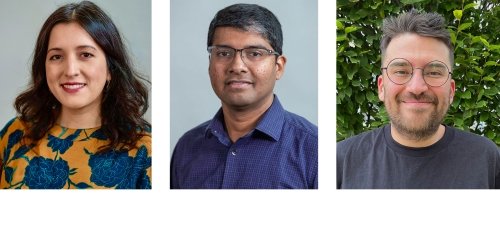Three RIC Faculty Members Awarded 2023 North Star Collective Fellowships
- News & Events
- News
- Three RIC Faculty Members Awarded 2023 North Star Collective Fellowships

The NSC fellowship provides BIPOC faculty with a nurturing and supportive community while they engage in professional development.
Assistant Professor of Sociology Alessandra Bazo Vienrich, Assistant Professor of Health and Physical Education Soumyadeep Mukherjee and Assistant Professor of English Ricardo Quintana-Vallejo (pictured above, from left) are the 2023 recipients of the North Star Collective (NSC) Faculty Fellowship designed to support the professional development of faculty members who are Black, Indigenous or other people of color (BIPOC).
RIC Provost and Vice President for Academic Affairs Helen Tate, stated, “We are proud to be an inaugural member of the North Star Collaborative, and we’re thrilled to have three faculty members selected for the second cohort of fellows. The scholarship of professors Bazo Vienrich, Quintana-Vallejo and Soumyadeep Mukherjee speaks to the mission of Rhode Island College and we are pleased to see them recognized and supported in their work.”
Beginning January 2023, each recipient will receive a $1,500 stipend for research, publication and professional development; attend a mentored writing retreat; participate in writing groups and workshops crafted to support their professional development and holistic growth; engage in network and peer mentorship opportunities; promote and elevate their research through the New England Board of Higher Education’s digital platforms and networks; and share their works-in-progress at a closing colloquium in May 2023.
The work these faculty are engaged in are as diverse as they themselves are. Bazo Vienrich’s ongoing research focuses on how legal status, place and Latinx identity intersect in the educational trajectories of undocumented Latinx students (referred to as DREAMers). Over the last decade she has examined how DREAMers navigate entry to college and successfully enroll in college. More recently she has begun to explore the role of high school counselors in undocumented students’ experiences around college access. During the fellowship period she will continue work on her book manuscript tentatively titled, “Conditioned to DREAM: The Education Gospel, Legal Liminality, and the American Dream,” which is under contract with the University of North Carolina Press.
Mukherjee’s research interests are in social determinants of health, including the far-reaching consequences of systemic racism and other structural inequities. Currently, he is examining disparities in a variety of mental and behavioral health outcomes, with particular focus on the barriers faced by BIPOC, neurodivergent individuals in accessing care, seeking accommodations and leading healthy and productive lives. Mukherjee will use his NSC fellowship to delve further into the literature for additional barriers and complete a manuscript on safety protocols that have the biggest impacts on school safety.
Quintana-Vallejo’s research explores contemporary diasporas and global migration in narratives about youth development. He is the author of “Children of Globalization: Diasporic Coming-of-Age Novels in Germany, England, and the United States” (2021) and will use his NSC fellowship to support the research and writing of his current book manuscript, which examines BIPOC coming-of-age narratives in comic books and graphic novels.
Interim Vice President of External Relations and Diversity Equity and Inclusion Anna Cano-Morales, who is also Interim Title IX Coordinator, says that resources like this fellowship are critically important for the retention and support of RIC faculty of color. “I am very pleased to know that our faculty are again participating in the NSC fellowship program and this time three of our faculty.”
Reflecting on the importance of representation, Cano-Morales adds that following a panel presentation at RIC in which she participated, faculty of color who were in attendance expressed their joy at seeing a person of color on the panel. “We immediately exchanged contact information,” she says. “Shortly thereafter, a small group of us had dinner. Representation matters. How we foster an inclusive community and a sense of belonging is so important. This fellowship program is one way.”
